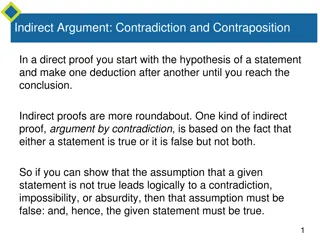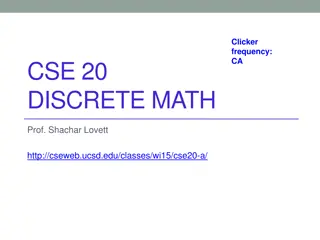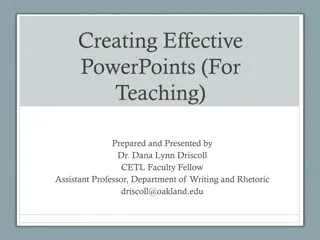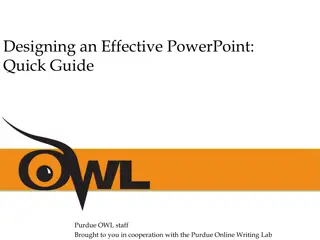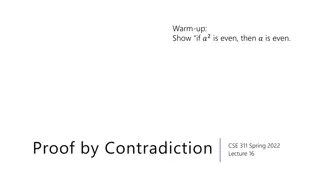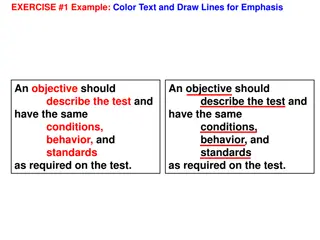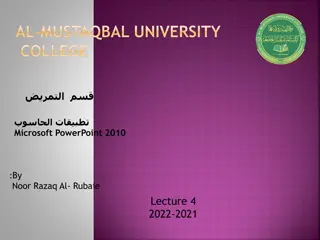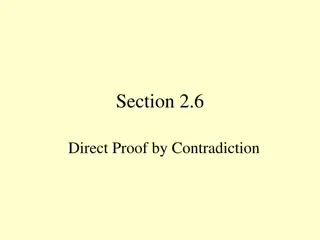
Answering Tough Questions About Christianity: Bible Contradictions Explained
Explore the topic of Bible contradictions in Christianity, addressing the challenges and understanding the perspectives of different organizations and viewpoints. Discover insights on inerrancy, truth, and the reliability of the Bible amidst differing interpretations.
Download Presentation

Please find below an Image/Link to download the presentation.
The content on the website is provided AS IS for your information and personal use only. It may not be sold, licensed, or shared on other websites without obtaining consent from the author. If you encounter any issues during the download, it is possible that the publisher has removed the file from their server.
You are allowed to download the files provided on this website for personal or commercial use, subject to the condition that they are used lawfully. All files are the property of their respective owners.
The content on the website is provided AS IS for your information and personal use only. It may not be sold, licensed, or shared on other websites without obtaining consent from the author.
E N D
Presentation Transcript
ANSWERING THE TOUGH QUESTIONS ABOUT CHRISTIANITY WHAT ABOUT ALL THE CONTRADICTIONS IN THE BIBLE?
THINK ABOUT THIS How can you believe the Bible is true when there are so many contradictions?
START HERE Satan knows that our faith is based on God's Word. Most of what we know about God and all we know about His desire to reconcile His relationship and fellowship with mankind through Jesus is recorded there. It should come as no surprise to us, therefore, that questioning the truth of the Bible is one of Satan's major attacks on our faith.
CONVERSATION EXAMPLE Your high school daughter tells you that a teacher told her he isn t a Christian because of all the errors and contradictions in the Bible.
AMERICAN HUMANIST ASSOCIATION: The Bible is an unreliable authority because it contains numerous contradictions. Logically, if two statements are contradictory, at least one of them is false. The biblical contradictions therefore prove that the book has many false statements and is not infallible.
MOBBERLY WEBSITE: The Holy Bible was written by divinely inspired men and is God s revelation of Himself to man. It is a perfect treasure of divine instruction. It has God for its author, salvation for its end, and truth, without any mixture of error, for its matter. Therefore, all Scripture is totally true and trustworthy.
WHAT IS MEANT BY INERRANCY Inerrancy means that when all facts are known, the Scriptures in their original autographs and properly interpreted will be shown to be wholly true in everything that they affirm, whether that has to do with doctrine or morality or with the social, physical or life sciences. Paul Feinberg - theologian, author, and professor of systematic theology
PRECISION AND TRUTH A certain amount of precision is often required for truth, but that amount varies from one context to another. In mathematics and science, truth often requires considerable precision. If a student says that 6+5=10, he has not told the truth. He has committed an error.
PRECISION AND TRUTH If you ask someone s age, the person s conventional response is to tell how old he was on his most recent birthday. But this is, of course, imprecise. If one fails to give that much precision, has he made an error? I think not, as we use the terms truth and error in ordinary language.
PRECISION AND TRUTH So, in reading the Bible, it is important to know enough about the language and culture of the people to know what claims the original characters and writers were likely making. John Frame - American Christian philosopher and theologian
Frame demonstrates that the level of precision required for inerrancy, or proclaiming truth, depends on many criteria, including the context, culture, and expectations of the audience.
Inerrancy does not mean that the human authors of the Bible cannot: Present different descriptions of the same events due to their different perspectives, audiences, and objectives. Use linguistic tools such as metaphors, similes, paraphrases, approximations, hyperboles, etc.
GOSPEL FOCUS When non-believers bring up "contradictions" in the Bible, these questions can prompt fruitful spiritual discussions for a few reasons:
GOSPEL FOCUS 1. They are interested in the topic because they brought it up and thus can be engaged in the conversation. 2. It allows us to dig deep into the Bible and reveal its truth.
GOSPEL FOCUS 3. It could lead to additional spiritual conversations and opportunities to share the gospel as we are confronted with questions that require more interaction (e.g., "That is an interesting question. Why don't we both do some study on our own and get back together to discuss what we have discovered?")
REVIEW AND DISCUSS Claims of errors in the Bible can be grouped in several categories. We will discuss three of these categories today: Different accounts of the same events Imprecise numbers, quotes, etc. Scribal errors and mistranslations
1. DIFFERENT ACCOUNTS OF BIBLICAL EVENTS DON T CONTRADICT ONE ANOTHER.
The critics claim the following two accounts contradict one another and thus one must be false:
18 Now this man [Judas] acquired a field with his unrighteous wages. He fell headfirst, his body burst open and his intestines spilled out. (Acts 1:18)
3 Then Judas, his betrayer, seeing that Jesus had been condemned, was full of remorse and returned the thirty pieces of silver to the chief priests and elders. 4 I have sinned by betraying innocent blood, he said. What s that to us? they said. See to it yourself!
5 So he threw the silver into the temple and departed. Then he went and hanged himself. 6 The chief priests took the silver and said, It s not permitted to put it into the temple treasury, since it is blood money. 7 They conferred together and bought the potter s field with it as a burial place for foreigners. (Matthew 27:3-7)
HOW CAN WE RECONCILE THESE ACCOUNTS? Matthew, writing to the Jews, focused on the involvement of the Jewish leaders in the incident. They, in a sense, purchased the field for Judas since they did not want to keep his tainted money.
HOW CAN WE RECONCILE THESE ACCOUNTS? Luke records in Acts a short summarization of the event by Peter as he starts the conversation about a replacement for Judas. Because funds provided by Judas were used to buy the field, Peter attributes the purchase to Judas.
HOW CAN WE RECONCILE THESE ACCOUNTS? Judas hanged himself, as Matthew states, but for some reason, fell from a sufficient height and/or onto something below (possibly after several days) and ruptured his abdomen, as Luke highlights.
DIFFERENCES IN THE RESURRECTION ACCOUNT CAN BE RESOLVED: 1. The different number and appearance of the angels at the tomb 2. Different amounts of light that morning (i.e., "still dark" vs. "at sunrise") 3. Was the tomb open or closed when the women arrive?
What other biblical accounts are you aware of that differ in their details? How can you reconcile the accounts so they are not contradictory? Discuss
2. IMPRECISE NUMBERS, QUOTES, ETC., ARE NOT BIBLICAL ERRORS.
Using varying degrees of precision in language does not create an error if the truth is properly communicated.
Matthew and Mark record that Peter, James, and John accompanied Jesus to His transfiguration six days after He said that some disciples would see the "kingdom of God come in power." Luke states the timing was "about 8 days after this conversation." Luke's approximation includes the precise number given by Matthew and Mark.
Instead of citing a specific Old Testament text, using a summarizing interpretation does not create an error.
Matthew says that Jesus moved to Nazareth to fulfill what was spoken through the prophets, that he would be called a Nazarene. No OT prophets say the Messiah will be a Nazarene. (Matt. 2:23)
However, many OT prophets write about His lowliness. To be from Nazareth was a byword for low status in the Israel of Jesus' day. ("Can anything good come out of Nazareth?" John 1:46)
Can you think of other biblical accounts that appear to have contradictory numbers or imprecise quotes? Discuss
3. SCRIBAL ERRORS AND MISTRANSLATIONS WERE NOT IN THE ORIGINAL DOCUMENTS, AND DO NOT AFFECT THE TRUTH BEING COMMUNICATED.
Differences in numbers found in some English Bible translations Example Solomons stalls 1 Kings 4 40,000 2 Chron 9 4,000 Could be a scribal error, or 4,000 could be a subset of the 40,000
Differences in the text can be due to improper translation: Age of King Ahaziah at start of reign 2 Kings 8:26 22 years 2 Chronicles 22:2 42 years He obviously had to be 22, based on other scriptures.
Philip Schaff calculated that, of the 150,000 variants known in his day among the various manuscripts, only 400 changed the meaning of the passage, only 50 were of real significance, and not even one affected an article of faith or precept of duty which is not abundantly sustained by other and undoubted passages, or by the whole tenor of Scripture teaching.
Why is it important for new believers to learn about these biblical "difficulties" and study them sufficiently to provide an explanation to those who ask? Discuss
A good question to ask a non-believer is: "Why do you think these errors and contradictions are still in the Bible? Reflect
How does the integrity of the Bible impact your daily walk with Christ? Discuss
Formulate a plan to handle situations when you are asked about a biblical "difficulty." What opportunity would you see? What tone of voice would you use? Apply






